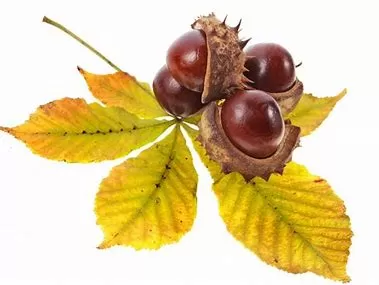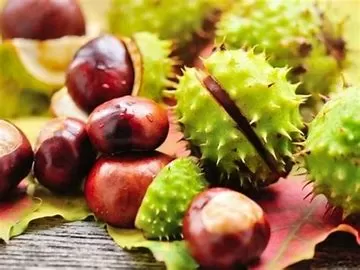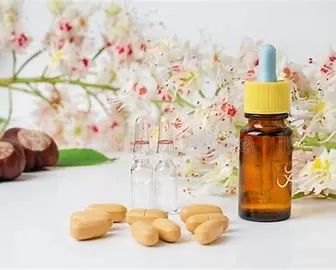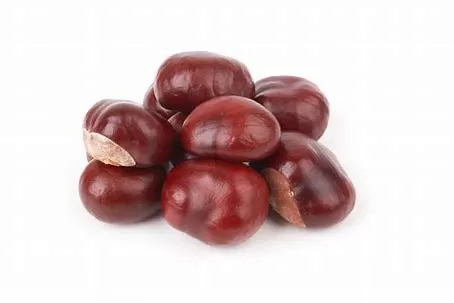- 0086-571-85302990
- sales@greenskybio.com
What Not to Take with Horse Chestnut Extract?
2025-05-28
Horse Chestnut Extract, derived from the seeds of the Aesculus hippocastanum tree, is widely used for its medicinal properties, particularly in treating chronic venous insufficiency (CVI), varicose veins, and swelling related to poor blood circulation. The extract contains aescin, a saponin with anti-inflammatory and vasoprotective characteristics, making it beneficial in supporting vascular health. However, like many herbal supplements, Horse Chestnut Extract can interact with other medications and supplements, leading to unintended consequences. This article explores the precautions and contraindications associated with Horse Chestnut Extract, emphasizing what not to take alongside it to ensure safe and effective use.
Understanding Horse Chestnut Extract
Horse chestnut extract is renowned for its ability to reduce venous swelling and improve blood flow. Its main active ingredient, aescin, helps strengthen vessel walls and reduce inflammation, offering therapeutic benefits for conditions like CVI and hemorrhoids. Despite its advantages, horse chestnut extract carries risks when taken with certain other substances due to its pharmacological effects and potential side effects, such as gastrointestinal upset, dizziness, and allergic reactions. Ensuring compatibility and safety requires attention to these factors.
Potential Drug Interactions
Anticoagulants and Antiplatelet Drugs: One of the critical interactions to consider is with anticoagulant and antiplatelet medications. These drugs, including warfarin, heparin, aspirin, and clopidogrel, help prevent blood clots by thinning the blood and inhibiting platelet aggregation. Horse chestnut extract also possesses blood-thinning properties and may increase the risk of bleeding when used concurrently with these medications. Combining them could exacerbate bleeding conditions or lead to bruising, necessitating close monitoring and professional guidance.
Non-steroidal Anti-inflammatory Drugs (NSAIDs): NSAIDs, such as ibuprofen and naproxen, are commonly used to relieve pain and inflammation. Horse chestnut extract's anti-inflammatory effects may overlap with NSAIDs, potentially leading to enhanced side effects, including gastrointestinal irritation and increased bleeding risk. Individuals taking NSAIDs for chronic pain management should consult their healthcare provider before considering horse chestnut extract to avoid compounding adverse effects.
Diabetes Medications: Horse chestnut extract can lower blood glucose levels, posing potential risks when combined with diabetes medications like insulin or oral hypoglycemic agents. This interaction may result in hypoglycemia, a condition marked by dangerously low blood sugar levels. Symptoms of hypoglycemia include dizziness, confusion, weakness, and, in severe cases, loss of consciousness. Patients must be vigilant and monitor blood sugar levels closely, adjusting their medication under professional supervision.
Other Herbal Supplements
Garlic, Ginger, and Ginkgo Biloba: Herbal supplements with anticoagulant properties, such as garlic, ginger, and ginkgo biloba, can interact with horse chestnut extract in a manner similar to pharmaceutical anticoagulants. Their combined effects can increase bleeding risk, so it is paramount to assess their use carefully and consult a healthcare professional before combining them.
St. John's Wort: St. John's Wort is known for its impact on medication metabolism, potentially affecting the efficacy of other drugs and supplements, including horse chestnut extract. Its ability to increase drug metabolism may reduce the effectiveness of horse chestnut extract, requiring guidance from a healthcare provider to prevent potential interaction complications.
Licorice Root: Licorice root, often taken for digestive and respiratory benefits, can affect potassium levels and elevate blood pressure. The potential blood pressure impacts of horse chestnut extract necessitate caution when considering licorice root as a concurrent supplement, as combined use may exacerbate electrolyte imbalances.
Considerations for Safe Use
Duration and Dosage: The dose and duration of horse chestnut extract therapy must be carefully considered to mitigate risks. Overuse may amplify side effects or interactions, highlighting the importance of adhering to recommended dosages and consulting healthcare professionals for tailored advice.
Monitoring and Alerting Healthcare Providers: Regular monitoring of symptoms and health parameters is crucial when taking horse chestnut extract, especially when using other medications or supplements. Informing healthcare providers of all substances taken ensures comprehensive assessment and interaction management.
Addressing Allergies and Sensitivities: Individuals with allergies or sensitivities should approach horse chestnut extract cautiously, as its use may provoke allergic responses. A history of sensitivity to tree nuts, for example, warrants attention, given horse chestnut's botanical classification.
Alternative Approaches and Solutions
For those with contraindications or risks associated with horse chestnut extract, alternative approaches to managing venous insufficiency and related conditions may be beneficial. Compression stockings, lifestyle modifications including exercise, weight management, and dietary adjustments can support vascular health independently or alongside compatible medications and supplements.
Complementary therapies such as massage and acupuncture may also provide relief for symptoms associated with CVI and varicose veins, enhancing overall circulation and reducing discomfort.
Conclusion
As with any supplement, careful consideration and awareness of potential interactions are crucial for safe horse chestnut extract use. Understanding what not to take with horse chestnut extract involves assessing concurrent medications and supplements, monitoring health parameters, and consulting healthcare providers for personalized advice. By paying attention to these factors, individuals can benefit from the therapeutic advantages of horse chestnut extract while minimizing risks, ultimately contributing to improved vascular health and overall well-being.
-
What are the benefits of taking Boswellia?
2025-05-28
-
Does horse chestnut raise blood sugar?
2025-05-28
-
Is horse chestnut FDA approved?
2025-05-28
-
Does horse chestnut affect blood pressure?
2025-05-28
-
Is horse chestnut extract safe?
2025-05-28
-
Is horse chestnut good for your legs?
2025-05-28














